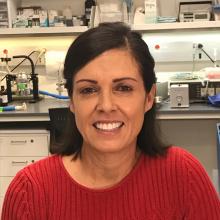Block Director, Gastrointestinal Systems, Metabolism, Diabetes, and Nutritional Science
Department of Basic Medical Sciences
Research Biography
Dr. Rayna J. Gonzales is an Associate Professor in the Department of Basic Medical Sciences at the University of Arizona College of Medicine Phoenix. Her research is in the field of vascular physiology and sex steroid biology. The long-term goal of her research is to contribute efforts towards the treatment and prevention of cerebro- and cardiovascular disease by advancing our understanding of cellular and molecular mechanisms involved in regulating blood vessel function and health. Specifically, her lab addresses the physiology and pharmacology of gonadal sex steroids as well as biological sex difference on molecular/cellular mechanisms and functional changes in the blood vessel wall that occur under normal and pathophysiological conditions (i.e. following an inflammatory stimuli or ischemia). Ongoing research areas of interest include i) the influence of gonadal sex steroids on regulation of inflammatory signaling pathways including pathways associated with hypoxia inducible factor 1 alpha and TLR4/NFkappaB during hypoxia- or ischemia-induced inflammation in the cerebral vasculature, ii) investigating the actions of novel endogenous gonadal sex steroid metabolites during ischemic injury and more recently during traumatic brain injury (TBI) on the cerebrovasculature, and iii) determining the impact of selective S1PR modulation endothelial function during brain ischemic injury.
Education
Post-Doctoral: Cerebrovascular Physiology at the University of California - Irvine.
PhD: Vascular Biology, University of New Mexico School of Medicine
MSc: Comparative Physiology, University of New Mexico
Selected Publications
Li Y, Shi SX, Liu Q, Shi FD & Gonzales RJ (2020). Targeted role for S1PR in endothelial function, neuroinflammation and neurovascular dysfunction during ischemic stroke. Neurosci Lett. Vol. 735
Li H, Zhou X, Li Y, Ma X, Gonzales RJ, Qiu S, Shi FD & Liu Q (2019). The selective sphingosine 1-phosphate receptor 1 modulator RP101075 improves microvascular circulation after cerebrovascular thrombosis. FASEB J. Vol. 33(10), 10935-10941.
Raman P, Madhavpeddi L & Gonzales RJ (2019). Palmitate induces glycosylation of cyclooxygenase-2 in primary human vascular smooth muscle cells. Am J Physiol Cell Physiol. Vol. 314(5), C545-C553.
Jin WN, Gonzales RJ, Feng Y, Wood K, Chai Z, Dong JF, La Cava A, Shi FD & Liu Q (2018). Brain ischemia induces diversified neuroantigen-specific T-cell responses that exacerbate brain injury. Stroke. Vol. 49(6), 1471-1478.
Gonzales, RJ. Androgens and the cerebrovasculature: modulation of vascular function during normal and pathophysiological conditions. Pflugers Arch (2013) May; 465(5):627-42 PMID: 23605065
Zuloaga KL, O’Connor DT, Handa RJ, and Gonzales RJ. Estrogen receptor beta dependent attenuation of cytokine-induced cyclooxygenase-2 by androgens in human brain vascular smooth muscle cells and rat mesenteric arteries. Steroids. (2012) Jul; 77(8-9):835-44. (Corresponding author) PMID: 22542504
Carroll CC, Steinmeyer R, McMullan DR, Whitt JA, Del Mundo JD, Ramos JE, Cauthon DJ, Letham T, and Gonzales RJ. Acute resistance exercise upregulates cyclooxygenase-1 and -2 activity in human skeletal muscle independent of enzyme protein content. Journal of Applied Physiology (2012) American Journal of Physiology, Regulatory, Integrative and Comparative Physiology 305(1): R24-30 PMID: 23637134
Zuloaga KL and Gonzales RJ. Dihydrotestosterone attenuates HIF-1alpha and Cyclooxygenase-2 in cerebral arteries following hypoxia or hypoxia with glucose deprivation. American Journal of Physiology Heart & Circulatory Physiology. (2011) Nov; 301(5):H1882-1890. (Corresponding author) PMID: 21856910


